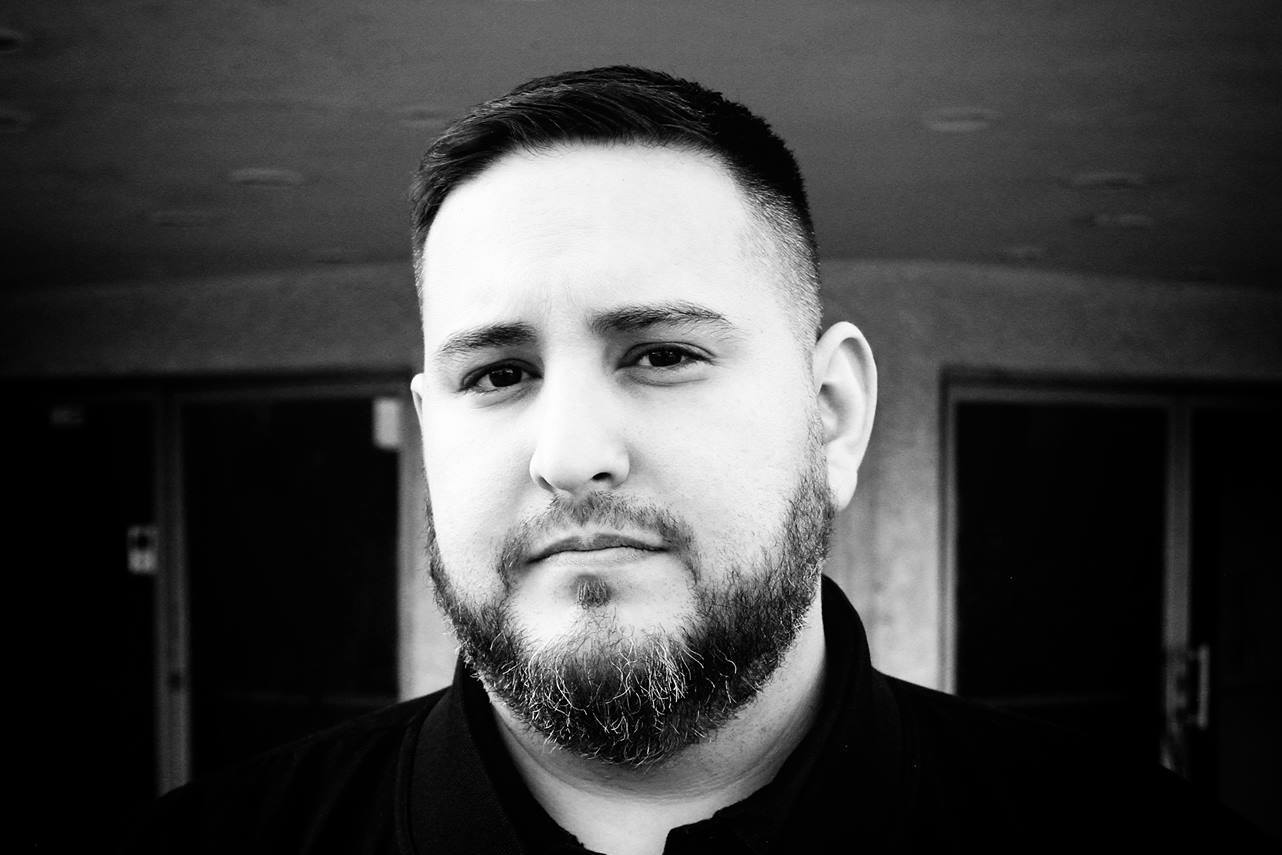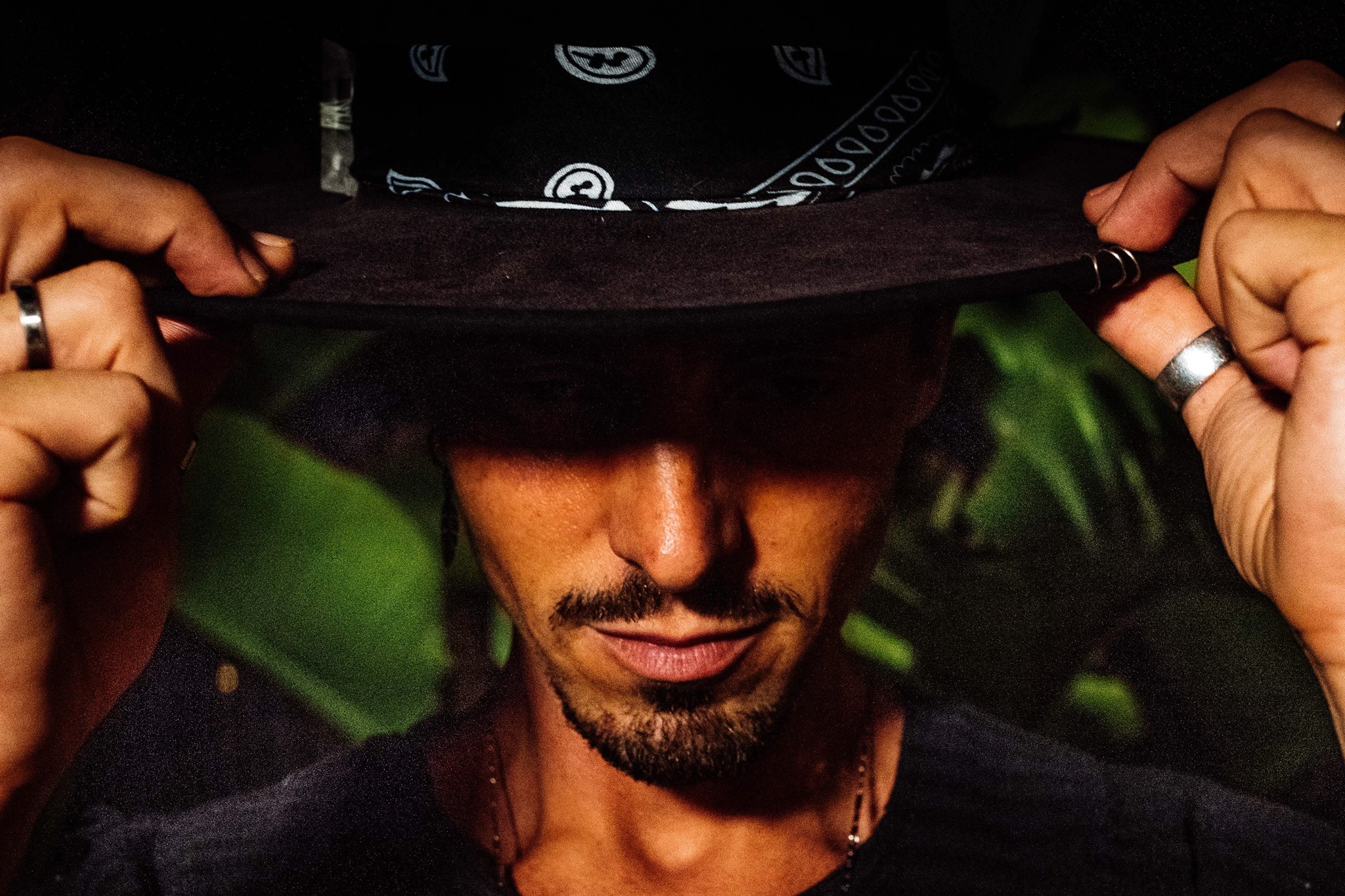Operating in the shadows of a subculture often blinded by fleeting moments, Drumcell works toward no simple task: to leave behind something that lasts.
Drumcell is among the small handful of names credited with writing the blueprint for Los Angeles techno raves. Moe Espinosa — the artist behind the alias — cannot be reduced to a single style. He’s equally suited for experimental live hardware sets under his and Luis Flores’ blistering modern industrial project Belief Defect as he is playing live ambient under his Hypoxia alias. His body of work has taken him from the renegade parties at his roots to such revered stages as Movement Music Festival in Detroit, Berghain in Berlin, and his own beloved Observe gatherings. It’s placed him at the vantage point necessary to clearly identify what it takes to go the distance.
Moe resisted the status quo as far back as childhood. Born first generation to a Mexican father and Egyptian mother, he began working at a Hollywood recording studio at only 13. Having absorbed a crossfire of disparate influences like punk, industrial, noise and gabber, he released his first vinyl record, a hip-hop turntablism EP, by age 17.
When he graduated high school, Moe’s parents couldn’t fathom why he showed no interest in university. Both had worked tirelessly to provide him with such an opportunity, but the lure of creative endeavors commanded his interest. They ultimately met in the middle; Moe enrolled in music production and engineering school.
For all their differences, Moe did inherit his parents’ tenacity. Upon completing his courses, he found work at recording studios around town, mixing and mastering records for A-listers like George Clinton and Whitney Houston while saving money to invest in a creative vision of his own. At the turn of the millennium, he helped launch the era-defining DROID BEHAVIOR.
DROID arrived when specialist techno still remained scarce in Los Angeles. They say the brighter the lights, the darker the shadows — and those cast by the entertainment capital of the world made for a culturally diverse environment in which the operation could grow organically. Intimate audiences in the dozens multiplied until the size of each crowd pushed organizers to break into disused warehouses.
These seminal gatherings offered proof of concept that fed into the explosion of West Coast techno. At the epicenter was Moe, who harnessed the kinetic energy to move with purpose.
2001 marked Moe Espinosa’s first recording as Drumcell, a remix of “Genetix” by Fabrik Nos. He followed it up with the Cell System EP, for which Daniel Chavez and Adam Jay offered up remixes of the title track. Drumcell’s early output earned him an audience with esteemed techno figureheads such as Luke Slater, Chris Liebing, and Speedy J. Their support played no small part in helping to expose his music to international markets.
Soon enough, Drumcell would visit those very locations himself. His cinematic style of electronic music came to captivate music lovers across five continents, each slow-burning soundscape a sonic reflection of his steadily building career momentum. All the while, he approached touring with the same sense of adventure that guided his subversive efforts as an organizer. Never one to shy away from performing in smaller markets, he takes pride in helping underground music scenes find their place in the global ecosystem.
As he came into his own, Drumcell grew hyperaware of the points of friction where artistry intersects with industry. He observed that techno producers endure pressure to create tools that are easy for DJs to use lest they revel in relative obscurity.
Drumcell rejected this premise, perhaps most notably with the release of his 2013 album Sleep Complex. Tracks like “Disturbance” and “Frame Shifter” argue in the brutalist syllables of a nonverbal language that impactful techno need not follow a predictable formula.
Nor does he need to restrict himself to a single genre. As Hypoxia, Moe Espinosa’s dissonant leanings steer him toward a melancholic iteration of ambient and downtempo music. He and Luis Flores anonymously debuted Belief Defect at Berlin Atonal 2017, eliciting thunderous applause for a live hardware performance of the project’s dissonant debut album, Decadent Yet Depraved. Moe has even lent his signature touch to scoring feature films and video games as well as producing and remixing for artists like Maynard James Keenan of Tool, Gary Numan, and Alessandro Cortini of Nine Inch Nails.
Moe’s creative process as Drumcell speaks to his exceptional focus. Rather than relying on any device’s tactile feedback as a prompt, he leads with the simple intention to capture a moment in time. He works backward to recreate its complex emotional profile through analog and digital synthesis, drawing upon science fiction overtones and a distinctly mechanical aesthetic. His cinematic timbres give gravity to primal polyrhythms at calculated integers, playing a psychological game by using suspense and anticipation as leverage.
Once he releases such a work, so too does he relinquish his own attachment to it. He accepts, even embraces that each listener will interpret his music differently than he does. As long as it inspires someone else to create purely and unapologetically with every breath that they take, as far as he’s concerned, the ends will have justified the means.
Drumcell has set into motion a positive feedback loop whose disturbance to the system only increases with the passage of time. What he’s helped build is bigger than anything he ever could on his own. It’s an obscure enigma that serves as a rare constant in the ever-shifting world of electronic music.




